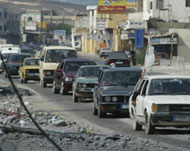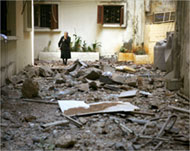Israel ‘breaking humanitarian law’
The United Nations emergency relief coordinator has accused Israel of breaking humanitarian law as he toured ruins in Beirut left by devastating Israeli air raids on residential areas.

Jan Egeland spoke during a visit to the Haret Hreik district of Beirut where Israeli air raids had struck just hours before, destroying a headquarters of Hezbollah.
“It is horrific. I did not know it was block after block of houses … It makes it a violation of humanitarian law,” Egeland told journalists.
He said it was hard to distinguish between military and civilian targets in the predominantly Shia Muslim neighbourhood.
Egeland said that the violence and destruction had to end. “It is costing too many lives and it will not lead to a solution in the south,” he said.
The UN official was in the region ahead of international appeal for aid for Lebanon. “It will be a large appeal. It’s got to be more than $100 million,” he said.
His comments came after two Israeli were killed in a Hezbollah rocket attack on Haifa as Israel’s airforce continued to pound Lebanon for a 12th successive day.
Aid corridors
Egeland plans to travel to Israel for further discussions on opening aid corridors.
Israel has said it will allow aid in through Beirut’s port, but it will be difficult for it to reach the people who need it as roads, bridges and trucks have been targeted by the Israeli air force.
 |
|
Thousands of people have fled |
At least 600,000 people have now been displaced by the fighting, according to the World Health Organisation.
Envoys from three European countries have joined the diplomatic effort to end the fighting between Hezbollah and Israel.
Ministers from France, Germany and Britain held separate talks with Israeli officials ahead of the arrival in the region of US secretary of state Condoleezza Rice on Sunday.
“My question to Jerusalem and Beirut is the same,” said Philippe Douste-Blazy, the French foreign minister. “How do we reach a ceasefire as quickly as possible?”
Rocket fire
Douste-Blazy was visiting the Israeli city of Haifa when it came under Hezbollah rocket fire that killed two people.
Israeli attacks have killed some 370 Lebanese, most of them civilians, while 37 Israelis have died during the conflict, 17 of them civilians killed by Hezbollah rockets in the north of the country.
 |
|
Southern Beirut has been hit by |
Douste-Blazy, German foreign minister Frank-Walter Steinmeier and British foreign office minister Kim Howells all met Israel’s foreign minister Tzipi Livni and other senior officials.
A German foreign ministry spokesman said Steinmeier discussed measures to “calm the situation” and lead to a ceasefire.
Howells, who during a stop in Beirut delivered Britain’s strongest criticism yet of the Israeli attacks, said; “We want to find a way to resolve this crisis as soon as possible.”
Syria is ready to talk with the US to resolve the crisis and wants for an immediate ceasefire between the two parties, deputy foreign minister Fayssal Mekdad said on Sunday.
“Syria is ready for dialogue with the United States based on respect and mutual interest,” Mekdad said.
Earlier, Syria – which provides support for Hezbollah – said it would enter the Israeli-Hezbollah conflict if Israeli ground troops approach the country.
Ceasefire rejected
“If Israel invades Lebanon over ground and comes near to us, Syria will not sit tight. She will join the conflict,” Syrian information minister Mohsen Bilal told the ABC newspaper.
The US has rejected the idea of an immediate ceasefire saying it would produce a “false promise” that would allow Hezbollah to survive and attack Israel in the future.
Aljazeera has learnt from Lebanese government sources that Saudi Arabia will suggest a series of measures to the five permanent members of the UN Security Council to solve the crisis.
The Saudi proposal will include a comprehensive ceasefire, exchange of prisoners, a solution to Shebaa Farms issue, and withdrawal of Hezbollah from borders with Israel.
Reports that the Gulf nation of Qatar is mediating between Israel and Hezbollah to end the current crisis have been denied by the country’s foreign minister Sheikh Hamad Bin Jassim Bin Jabr Al-Thani.
Israeli foreign ministry spokesman Mark Regev had said earlier, “Qatar is a country that we have met in the past … If Qatar is working behind the scenes to secure the release of the hostages that is a good thing.”
But Sheikh Hamad bin Jassim bin Jabr al-Thani told Al Jazeera television, “I do not think that there is any direct or indirect mediation between us and Israel or Hezbollah through the Lebanese government.
“I think this was a leak to serve as an attempt to weaken the morale of the Lebanese resistance.”
Foreign ministers from around the world are due to hold an emergency meeting in Rome on Wednesday to discuss the crisis. No decision on international action is likely before then.